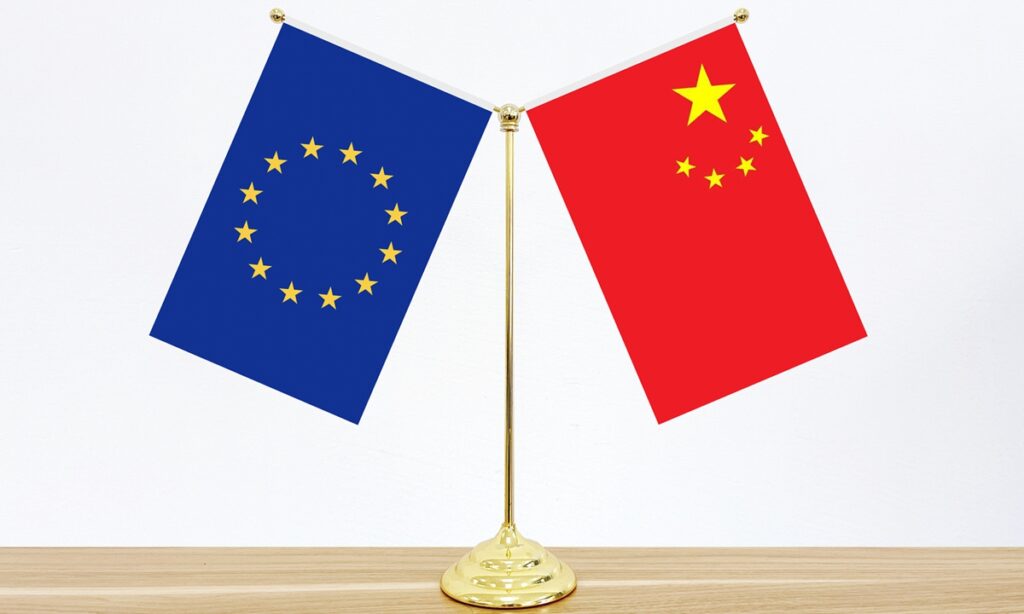As French President Emmanuel Macron and European Commission President Ursula von der Leyen were scheduled to kick off a three-day visit to China on Wednesday, observers generally believe the visit could be seen as a rare window into the EU’s position on its cooperation with China.
Despite headwinds on Europe’s China policy, such as “reducing dependence on China” rhetoric, China and the EU are also seeking opportunities for further cooperation, otherwise we would not have seen the intensive recent visits by European leaders to China. Macron and Von der Leyen’s visit comes on the heels of Spanish Prime Minister Pedro Sanchez’s visit to China, and they are likely to be followed by German Foreign Minister Annalena Baerbock in mid-April.
The development underscores China’s status as one of the most important trading partners of France, Germany and even the EU as a whole. China and the EU were each other’s second largest trading partner in 2022. With the gradual return of a rational and pragmatic attitude to the EU’s China policy, there is still plenty of space for bilateral and multilateral cooperation in the future.
For starters, China’s promising economic potential and continued commitment to high-quality opening-up have laid a solid foundation for bilateral economic, trade as well as scientific and technological cooperation.
Second, the EU is currently battling with various economic challenges in the wake of the Russia-Ukraine conflict, including how to improve the region’s overall competitiveness, speed up an energy transition and strengthen its financial risk-prevention ability, among others. And a strengthened economic and trade cooperation with China will be of great significance to the stability and improvement of the current EU economy. For instance, against the backdrop of the continuing energy crisis, the two sides can coordinate and cooperate on such aspects as the production and investment of solar panels, lithium batteries and other green energy sources, as well as the construction of infrastructure aimed at promoting the diversification of energy sources in Europe.
Third, the need for greater China-EU cooperation also stems from the growing awareness in Europe for strategic autonomy. While the US and the EU are allies, the US always puts its own interests above others. When the Biden administration rolled out the Inflation Reduction Act, it was clear that it was not only aimed at containing China, but is also severely undercutting Europe’s interests.
Fundamentally speaking, there is no geopolitical conflict between China and the EU, but broad common interests. The more complex the situation is, the more rational the two sides should be. Only by giving full play to their complementarities to achieve win-win cooperation can the EU avoid recession and move toward growth.
Of course, China-EU cooperation is facing growing challenges in the changeable international environment, but it all hinges on what kind of choices we will make. At a time when the global trade, energy, and manufacturing landscape is shifting, the further development of bilateral cooperation in the next stage will inevitably require more flexibility and efforts from both sides to overcome difficulties and challenges.
When meeting with Dutch chip-making equipment maker ASML’s CEO Peter Wennink in late March, Chinese Commerce Minister Wang Wentao said that China will unswervingly promote high-level opening-up and is willing to create a good business environment and provide efficient services for multinational companies, which includes ASML, to develop in the country. And he also hopes that ASML will strengthen its confidence in trade and investment cooperation with China, make contributions to China-Netherlands economic and trade cooperation, and jointly safeguard the stability of the global industrial and supply chains in the semiconductor sector.
There is no denying the Netherlands or the EU may be undergoing pressure from the US, but if the Netherlands and the EU do not want to take any risk or bear any pressure, or cannot fight for their own interests, the goodwill from the Chinese side alone is not enough for deepening bilateral cooperation. Because only by better resisting US pressure can the EU create greater opportunities for cooperation with China.
The same logic not only applies to cooperation in the semiconductor sector, but also to other issues in China-EU cooperation. Given the current economic and global situation, it is hoped that the EU leadership would show more political courage and determination to elevate China-EU cooperation, such as pushing for the ratification of the EU-China Comprehensive Agreement on Investment, for the sake of helping their own businesses and economies.
(Global Times)




